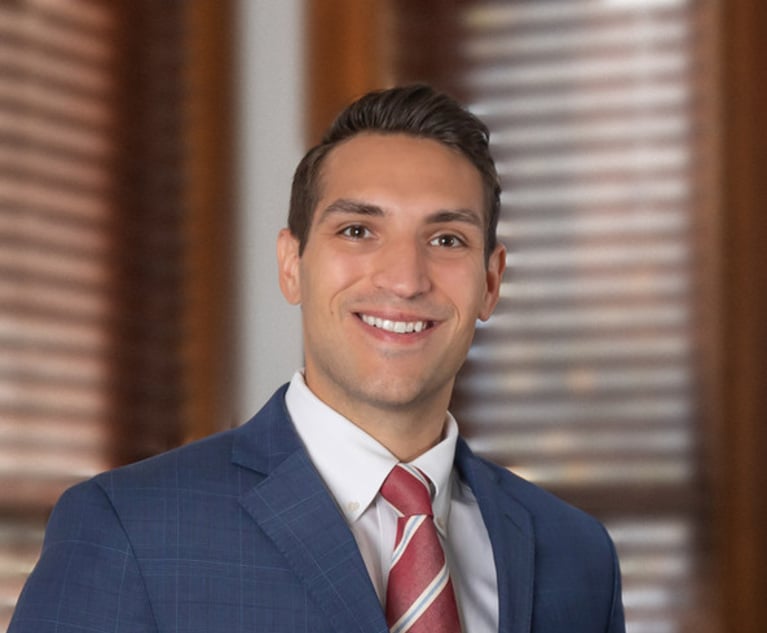Victims of 2015 Attempted Home Invasion Settle for $1.3M
The three families who were victims of an attempted home invasion in Salem 2 1/2 years ago have agreed on a $1.3 million settlement. Attorneys for the family said the suspect, who left a residential home, later told police he wanted to kill the homeowners.
November 28, 2017 at 04:27 PM
5 minute read

Three Salem families who were victims of a May 2015 attempted home invasion will divvy up nearly $1.33 million as part of a settlement from a now-defunct group home accused of housing an individual that was a danger to fellow residents and the community at large.
The Nov. 15 settlement comes 2.5 years after the families woke up in the middle of the night to find a mentally unstable man on their property. The man, Nicholas Benner, told police afterward that he wanted to kill the families.
Three lawsuits were filed on behalf of the families and consolidated against Key Human Services in October 2016.
The lawsuits claimed Key—a residential home that housed men with autism and intellectual disabilities—should never have allowed Benner to live there based on his past violent behavior.
Kara Burgarella, attorney for the families, said the settlement will not be divided up equally among the families. The amount given to each family was not disclosed per the terms of the settlement.
Mediation between attorneys for the residential home and Burgarella began Oct. 2 before retired Judge Michael Riley. After six weeks of going back and forth on settlement offers, Riley announced his $1.325 million settlement decision on Nov. 15. The money was disbursed Monday.
Burgarella said the first offer from Key was about $600,000, while the first offer from the families was about $2 million.
According to Burgarella and the lawsuits, Benner had a history of violence prior to being placed at Key. The lawsuits claim Benner suffered from a number of mental health disorders, including intermittent explosive disorder.
“We took the deposition of Benner's mother who talked about his violent past,” said Burgarella, a partner with Faulkner & Graves in New London. “She admitted he had attempted murder in the past. Prior to moving to Salem, he lived in a facility in Southbury and had gone to the home of a pregnant woman and confronted her. The woman's boyfriend ended up coming out with a shotgun.”
Benner was eventually taken to a mental institution within Danbury Hospital and then to Key in Salem, which is located in rural southeastern Connecticut.
Benner left the residential home in May 2015, just one month after he arrived. He went on the properties of three homes located within a quarter of a mile of each other, Burgarella said.
Benner first went to the home of Patricia Anderson and began banging on the porch, Burgarella said. “She thought it was an animal outside and went to the front door and opened it. He was standing right there.”
Anderson slammed the door and called police, Burgarella said. Burgarella said police were aware Benner left the facility and told her to leave the house. She fled to a neighbor's house and, once at the neighbor's house, saw Benner “with a huge stick, banging on her car.”
Benner then went to the home of Linda and Stanley Motyl. The Motyls, Burgarella said, also heard banging at their door. Linda Motyl said she called her husband to get his shotgun when she saw Benner at the door with a stick. Benner threatened to destroy the family truck and left before Stanley Motyl was able to get his gun from the garage.
Benner then went to the home of Shaun and Joseph Formica. In that case, Burgarella said, Benner smashed a bathroom window to get into the bedroom.
Burgarella said Shaun Formica, who was pregnant, screamed for her husband who turned on the lights in the house from the bedroom. Joseph Formica then went outside the house to where he though Benner had gone, Burgarella said. Joseph Formica hid behind a slider curtain to confront Benner, but police had arrived and used a Taser on the suspect, the attorney said.
None of the victims were assaulted by Benner, though they feared for their life, Burgarella said.
Benner was charged with four counts of criminal attempt to commit home invasion, a felony, and misdemeanor counts of first-degree criminal mischief, second-degree criminal mischief and interfering with an officer.
The charges were dismissed with the understanding that Benner be placed in a group facility. “The charges were dismissed because he was unable to stand trial or understand what the charges were against him,” Burgarella said.
He ended up at several Connecticut facilities for people with mental disabilities. He's currently at the Florida Institute for Neurological Rehabilitation in Wauchula.
Keystone Human Services in Harrisburg, Pennsylvania, was the parent company of Key in Salem. No one at Keystone responded to a request for comment.
Keystone was represented by Scott Ober, a partner with Hassett & Donnelly in Hartford. Ober also didn't respond to a request for comment.
Burgarella was assisted in the case by partner Dale Faulkner.
This content has been archived. It is available through our partners, LexisNexis® and Bloomberg Law.
To view this content, please continue to their sites.
Not a Lexis Subscriber?
Subscribe Now
Not a Bloomberg Law Subscriber?
Subscribe Now
NOT FOR REPRINT
© 2025 ALM Global, LLC, All Rights Reserved. Request academic re-use from www.copyright.com. All other uses, submit a request to [email protected]. For more information visit Asset & Logo Licensing.
You Might Like
View All
Second Circuit Upholds $5M Judgment Against Trump in E. Jean Carroll Case
4 minute read

Art of the Settlement: Trump Attorney Reveals Strategy in ABC Lawsuit
Trending Stories
- 1Big Company Insiders See Technology-Related Disputes Teed Up for 2025
- 2Attorney Fee Reimbursement for Non-Party Subpoena Recipients under CPLR 3122(d)
- 3‘Second’ Time’s a Charm? The Second Circuit Reaffirms the Contours of the Special Interest Beneficiary Standing Rule
- 4Lobbying-Focused Brownstein Hyatt Opens 13th Office in Tampa
- 5Amid Race for Top Talent, Latham Focuses on Lateral Integration
Who Got The Work
Michael G. Bongiorno, Andrew Scott Dulberg and Elizabeth E. Driscoll from Wilmer Cutler Pickering Hale and Dorr have stepped in to represent Symbotic Inc., an A.I.-enabled technology platform that focuses on increasing supply chain efficiency, and other defendants in a pending shareholder derivative lawsuit. The case, filed Oct. 2 in Massachusetts District Court by the Brown Law Firm on behalf of Stephen Austen, accuses certain officers and directors of misleading investors in regard to Symbotic's potential for margin growth by failing to disclose that the company was not equipped to timely deploy its systems or manage expenses through project delays. The case, assigned to U.S. District Judge Nathaniel M. Gorton, is 1:24-cv-12522, Austen v. Cohen et al.
Who Got The Work
Edmund Polubinski and Marie Killmond of Davis Polk & Wardwell have entered appearances for data platform software development company MongoDB and other defendants in a pending shareholder derivative lawsuit. The action, filed Oct. 7 in New York Southern District Court by the Brown Law Firm, accuses the company's directors and/or officers of falsely expressing confidence in the company’s restructuring of its sales incentive plan and downplaying the severity of decreases in its upfront commitments. The case is 1:24-cv-07594, Roy v. Ittycheria et al.
Who Got The Work
Amy O. Bruchs and Kurt F. Ellison of Michael Best & Friedrich have entered appearances for Epic Systems Corp. in a pending employment discrimination lawsuit. The suit was filed Sept. 7 in Wisconsin Western District Court by Levine Eisberner LLC and Siri & Glimstad on behalf of a project manager who claims that he was wrongfully terminated after applying for a religious exemption to the defendant's COVID-19 vaccine mandate. The case, assigned to U.S. Magistrate Judge Anita Marie Boor, is 3:24-cv-00630, Secker, Nathan v. Epic Systems Corporation.
Who Got The Work
David X. Sullivan, Thomas J. Finn and Gregory A. Hall from McCarter & English have entered appearances for Sunrun Installation Services in a pending civil rights lawsuit. The complaint was filed Sept. 4 in Connecticut District Court by attorney Robert M. Berke on behalf of former employee George Edward Steins, who was arrested and charged with employing an unregistered home improvement salesperson. The complaint alleges that had Sunrun informed the Connecticut Department of Consumer Protection that the plaintiff's employment had ended in 2017 and that he no longer held Sunrun's home improvement contractor license, he would not have been hit with charges, which were dismissed in May 2024. The case, assigned to U.S. District Judge Jeffrey A. Meyer, is 3:24-cv-01423, Steins v. Sunrun, Inc. et al.
Who Got The Work
Greenberg Traurig shareholder Joshua L. Raskin has entered an appearance for boohoo.com UK Ltd. in a pending patent infringement lawsuit. The suit, filed Sept. 3 in Texas Eastern District Court by Rozier Hardt McDonough on behalf of Alto Dynamics, asserts five patents related to an online shopping platform. The case, assigned to U.S. District Judge Rodney Gilstrap, is 2:24-cv-00719, Alto Dynamics, LLC v. boohoo.com UK Limited.
Featured Firms
Law Offices of Gary Martin Hays & Associates, P.C.
(470) 294-1674
Law Offices of Mark E. Salomone
(857) 444-6468
Smith & Hassler
(713) 739-1250











